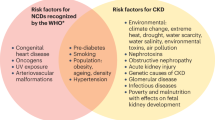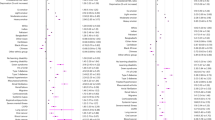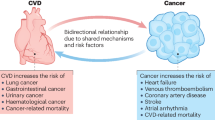Abstract
A number of risk scores already exist to predict cardiovascular (CV) events. However, scores developed with data collected some time ago might not accurately predict the CV risk of contemporary hypertensive patients that benefit from more modern treatments and management. Using data from the randomised clinical trial Anglo-Scandinavian Cardiac Outcomes Trial-BPLA, with 15 955 hypertensive patients without previous CV disease receiving contemporary preventive CV management, we developed a new risk score predicting the 5-year risk of a first CV event (CV death, myocardial infarction or stroke). Cox proportional hazard models were used to develop a risk equation from baseline predictors. The final risk model (ASCORE) included age, sex, smoking, diabetes, previous blood pressure (BP) treatment, systolic BP, total cholesterol, high-density lipoprotein–cholesterol, fasting glucose and creatinine baseline variables. A simplified model (ASCORE-S) excluding laboratory variables was also derived. Both models showed very good internal validity. User-friendly integer score tables are reported for both models. Applying the latest Framingham risk score to our data significantly overpredicted the observed 5-year risk of the composite CV outcome. We conclude that risk scores derived using older databases (such as Framingham) may overestimate the CV risk of patients receiving current BP treatments; therefore, ‘updated’ risk scores are needed for current patients.
This is a preview of subscription content, access via your institution
Access options
Subscribe to this journal
Receive 12 digital issues and online access to articles
$119.00 per year
only $9.92 per issue
Buy this article
- Purchase on Springer Link
- Instant access to full article PDF
Prices may be subject to local taxes which are calculated during checkout


Similar content being viewed by others
References
Wood D, Poulter N, Williams B, Wray R, Kirby M, Patel V et al. JBS 2: Joint British Societies’ guidelines on prevention of cardiovascular disease in clinical practice. Heart 2005; 91 (Suppl 5): v1–52.
Mancia G, De Backer G, Dominiczak A, Cifkova R, Fagard R, Germano G et al. 2007 ESH-ESC Practice Guidelines for the Management of Arterial Hypertension: ESH-ESC Task Force on the Management of Arterial Hypertension. J Hypertens 2007; 25: 1751–1762.
Anderson KM, Odell PM, Wilson PW, Kannel WB . Cardiovascular disease risk profiles. Am Heart J 1991; 121: 293–298.
New Zealand Guidelines Group. The Assessment and Management of Cardiovascular Risk. New Zealand Guideline Group: Wellington, New Zealand, 2003 Available from http://www.nzgg.org.nz/guidelines/dsp_guideline_popup.cfm?guidelineID=35).
Pocock SJ, McCormack V, Gueyffier F, Boutitie F, Fagard RH, Boissel JP . A score for predicting risk of death from cardiovascular disease in adults with raised blood pressure, based on individual patient data from randomised controlled trials. Br Med J 2001; 323: 75–81.
Conroy RM, Pyörälä K, Fitzgerald AP, Sans S, Menotti A, De Backer G et al. Estimation of ten-year risk of fatal cardiovascular disease in Europe: the SCORE project. Eur Heart J 2003; 24: 987–1003.
D’Agostino RB, Vasan RS, Pencina MJ, Wolf PA, Cobain M, Massaro JM et al. General cardiovascular risk profile for use in primary care: the Framingham Heart Study. Circulation 2008; 117: 743–753.
Hippisley-Cox J, Coupland C, Vinogradova Y, Robson J, May M, Brindle P . Derivation and validation of QRISK, a new cardiovascular disease risk score for the United Kingdom: prospective open cohort study. Br Med J 2007; 335: 136.
Primatesta P, Poulter NR . Levels of dyslipidaemia and improvement in its management in England: results from the Health Survey for England 2003. Clinical Endocrinology 2006; 64: 292–298.
Falaschetti E, Chaudhury M, Mindell J, Poulter N . Continued improvement in hypertension management in England: results from the Health Survey for England 2006. Hypertension 2009; 53: 480–486.
Sever PS, Dahlöf B, Poulter NR, Wedel H, Beevers G, Caulfield M et al. Rationale, design, methods and baseline demography of participants of the Anglo-Scandinavian Cardiac Outcomes Trial. ASCOT-BPLA investigators. J Hypertens 2001; 19: 1139–1147.
Dahlöf B, Sever PS, Poulter NR, Wedel H, Beevers DG, Caulfield M et al. Prevention of cardiovascular events with an antihypertensive regimen of amlodipine adding perindopril as required versus atenolol adding bendroflumethiazide as required, in the Anglo-Scandinavian Cardiac Outcomes Trial-Blood Pressure Lowering Arm (ASCOT-BPLA): a multicentre randomised controlled trial. Lancet 2005; 366: 895–906.
Sever PS, Dahlöf B, Poulter NR, Wedel H, Beevers G, Caulfield M et al. Prevention of coronary and stroke events with atorvastatin in hypertensive patients who have average or lower-than-average cholesterol concentrations, in the Anglo-Scandinavian Cardiac Outcomes Trial—Lipid-lowering Arm (ASCOT-LLA): a multicentre randomised controlled trial. Lancet 2003; 361: 1149–1158.
Levey AS, Bosch JP, Lewis JB, Greene T, Rogers N, Roth D . A more accurate method to estimate glomerular filtration rate from serum creatinine: a new prediction equation. Modification of Diet in Renal Disease Study Group. Ann Intern Med 1999; 130: 461–470.
Clark TG, Altman DG . Developing a prognostic model in the presence of missing data: an ovarian cancer case study. J Clin Epidemiol 2003; 56: 28–37.
Hosmer DW, Lemeshow S . Applied Logistic Regression 1st edition John Wiley & Sons, Inc., 1989.
D'Agostino R, Nam B . Evaluation of the Performance of Survival Analysis Models: Discrimination and Calibration Measures. In: Handbook of Statistics, pp 1–25. Elsevier: Amsterdam, 2004.
Pencina MJ, D’Agostino RBS, D’Agostino RBJ, Vasan RS . Evaluating the added predictive ability of a new marker: From area under the ROC curve to reclassification and beyond. Stat Med 2008; 27: 157–172.
Antman EM, Cohen M, Bernink PJ, McCabe CH, Horacek T, Papuchis G et al. The timi risk score for unstable angina/non-st elevation mi: A method for prognostication and therapeutic decision making. JAMA 2000; 284 (7): 835–842.
Clayton TC, Lubsen J, Pocock SJ, Vokó Z, Kirwan B-A, Fox KAA et al. Risk score for predicting death, myocardial infarction, and stroke in patients with stable angina, based on a large randomised trial cohort of patients. BMJ 331 (7521): 869 2005.
Acknowledgements
The ASCOT trial and associated analyses were supported by research grants from Pfizer. However, the study is investigator-led and independent of any influence from the funder. Neil Poulter and Peter Sever are supported by the National Institute for Health Research Senior Investigator Awards, Biomedical Research Centre funding and the British Heart Foundation Research Centre Excellence Awards. The ASCOT trial was ratified by the central and regional ethics review boards in the United Kingdom, and by national ethics and statutory bodies in Ireland and Nordic countries. Patients gave written informed consent to participate in the trial before randomisation.
Author information
Authors and Affiliations
Consortia
Corresponding author
Ethics declarations
Competing interests
The International Centre for Circulatory Health, Imperial College London, where N Poulter and P Sever are based, received support from Pfizer for the submitted work; N Poulter, P Sever, A Gupta, B Dahlof, H Wedel and S Pocock have served as consultants to and/or received funding for research, and/or received travel expenses or payment for speaking at meetings from one or more pharmaceutical companies marketing blood-pressure-lowering or lipid-lowering drugs that might have an interest in the submitted work in the previous 3 years; their spouses, partners, or children have no financial relationships that may be relevant to the submitted work; and all authors have no non-financial interests that may be relevant to the submitted work.
Additional information
Parts of this work have been presented as oral communications at the Annual Scientific Meeting of the British Hypertension Society, September 2009, and at the 19th Meeting of the European Hypertension Society, June 2009.
Supplementary Information accompanies the paper on the Journal of Human Hypertension website
Rights and permissions
About this article
Cite this article
Prieto-Merino, D., Dobson, J., Gupta, A. et al. ASCORE: an up-to-date cardiovascular risk score for hypertensive patients reflecting contemporary clinical practice developed using the (ASCOT-BPLA) trial data. J Hum Hypertens 27, 492–496 (2013). https://doi.org/10.1038/jhh.2013.3
Received:
Revised:
Accepted:
Published:
Issue Date:
DOI: https://doi.org/10.1038/jhh.2013.3



